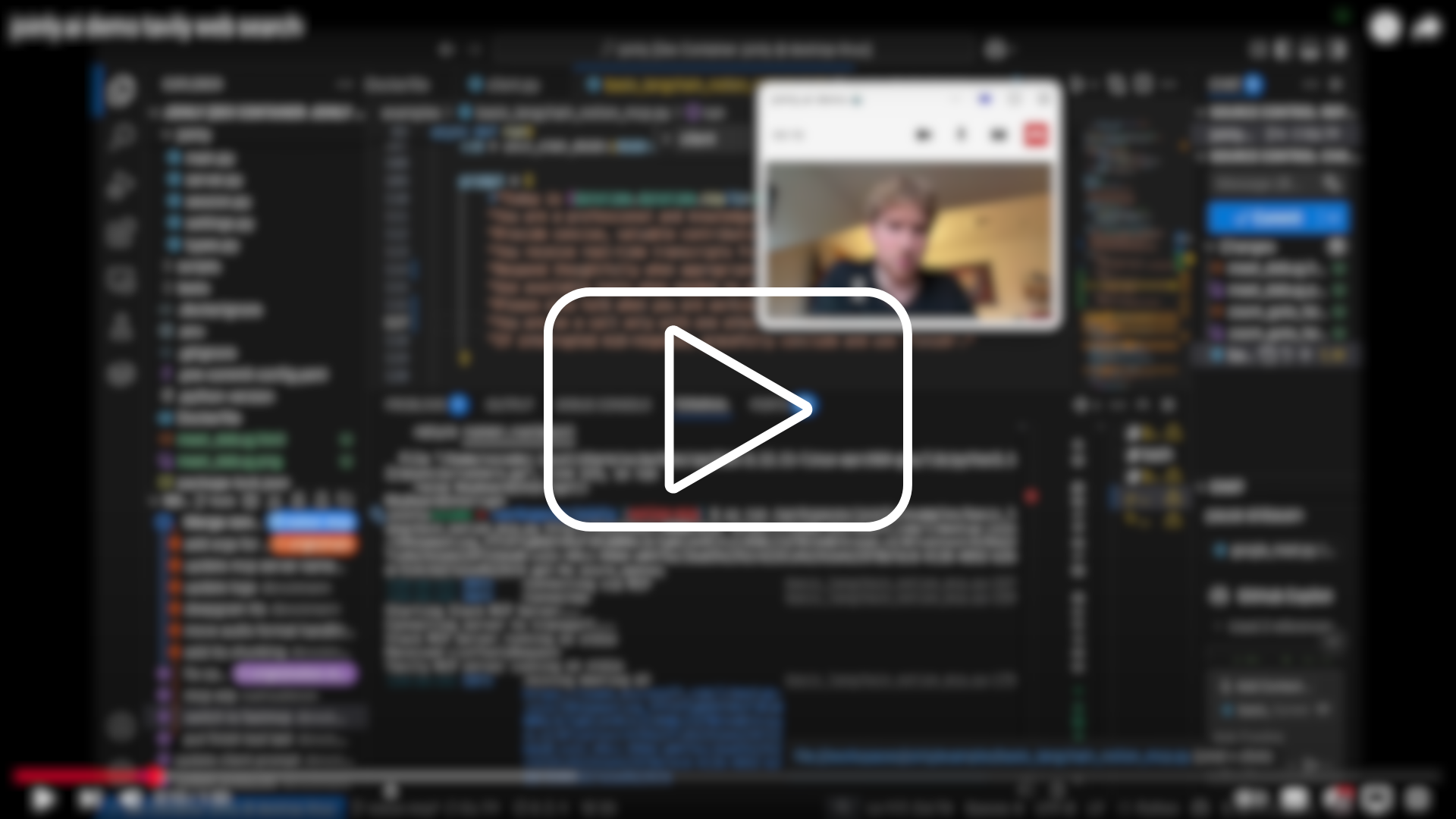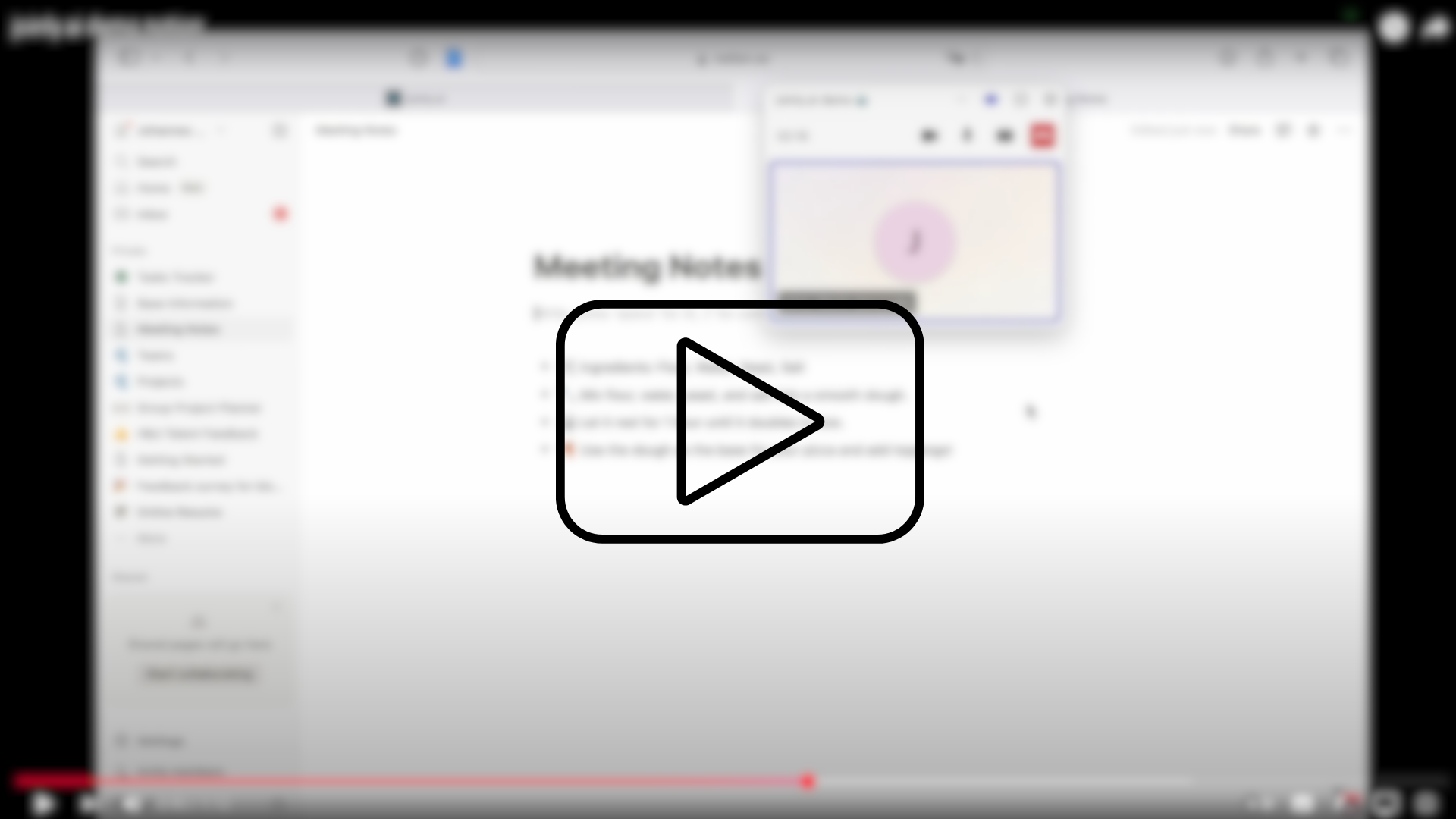joinly.ai is a connector middleware designed to enable AI agents to join and actively participate in video calls. Through its MCP server, joinly.ai provides essential meeting tools and resources that can equip any AI agent with the skills to perform tasks and interact with you in real time during your meetings.
Want to dive right in? Jump to the Quickstart! Want to know more? Visit our website!
- Live Interaction: Lets your agents execute tasks and respond in real-time by voice or chat within your meetings
- Conversational flow: Built-in logic that ensures natural conversations by handling interruptions and multi-speaker interactions
- Cross-platform: Join Google Meet, Zoom, and Microsoft Teams (or any available over the browser)
- Bring-your-own-LLM: Works with all LLM providers (also locally with Ollama)
- Choose-your-preferred-TTS/STT: Modular design supports multiple services - Whisper/Deepgram for STT and Kokoro/Deepgram for TTS (and more to come...)
- 100% open-source, self-hosted and privacy-first 🚀
In this demo video, you can see joinly anwsering simple questions by accessing the latest news from the web.
In this demo video, we connect joinly to our notion via MCP and let it edit the content of a page content live in the meeting.
Any ideas what we should build next? Write us! 🚀
Run joinly via Docker with a basic conversational agent client.
- Prerequisites: Docker installation
Clone this repository:
Create a new .env file in the project root with your API keys. See .env.example for complete configuration options including Anthropic (Claude) and Ollama setups. Replace the placeholder values with your actual API keys and adjust the model name as needed.
Pull the Docker image (~2.3GB since it packages browser and models):
Launch your meeting in Zoom, Google Meet or Teams and let joinly join the meeting using the meeting link as <MeetingURL>:
🔴 Having trouble getting started? Let's figure it out together on our discord!
In Quickstart, we ran the Docker Container directly as a client using --client. But we can also run it as a server and connect to it from outside the container, which allows us to control the entire logic of our agent. Here, we run an external client implementation and connect it to the joinly MCP server.
- Prerequisites: do the Quickstart (except the last command), install uv, and open two terminals
Start the joinly server in the first terminal (note, we are not using --client here and forward port 8000):
While the server is running, start the example client implementation in the second terminal window to connect to it and join a meeting:
Add the tools of any MCP server to the example client by providing a JSON configuration. In config_tavily.json, we add the Tavily MCP server for web search functionality (requires TAVILY_API_KEY in .env):
You can also add multiple entries under "mcpServers" which will all be available as tools in the meeting (see fastmcp client docs for config syntax). Then, run the client using the config file (--config <file>):
You can also write your own client from scratch and connect it to our joinly MCP server. See client_example.py for a starting point.
The joinly MCP server provides following tools and resources:
- join_meeting - Join meeting with URL, participant name, and optional passcode
- leave_meeting - Leave the current meeting
- speak_text - Speak text using TTS (requires text parameter)
- send_chat_message - Send chat message (requires message parameter)
- mute_yourself - Mute microphone
- unmute_yourself - Unmute microphone
- more soon...
- transcript://live - Live meeting transcript in JSON format. Subscribable for real-time updates when new utterances are added.
For development we recommend using the development container, which installs all necessary dependencies. To get started, install the DevContainer Extension for Visual Studio Code, open the repository and choose Reopen in Container.
The installation can take some time, since it downloads all packages as well as models for Whisper/Kokoro and the Chromium browser. At the end, it automatically invokes the download_assets.py script. If you see errors like Missing kokoro-v1.0.onnx, run this script manually using:
We'd love to see what you are using it for or building with it. Showcase your work on our discord
Meeting
- Camera in video call with status updates
- Enable screen share during video conferences
- Meeting chat as resource
- Participant metadata and joining/leaving
- Improve browser agent capabilities
Conversation
- Improve client memory: reduce token usage, allow persistence across meetings events
- Improve End-of-Utterance/turn-taking detection
- Human approval mechanism from inside the meeting
- Speaker diarization
Integrations
- Showcase how to add agents using the A2A protocol
- Add more provider integrations (STT, TTS)
- Integrate meeting platform SDKs
- Add alternative open-source meeting provider
- Add support for Speech2Speech models
Contributions are always welcome! Feel free to open issues for bugs or submit a feature request. We'll do our best to review all contributions promptly and help merge your changes.
Please check our Roadmap and don't hesitate to reach out to us!
This project is licensed under the MIT License ‒ see the LICENSE file for details.
If you have questions or feedback, or if you would like to chat with the maintainers or other community members, please use the following links:
Made with ❤️ in Osnabrück
.png)












